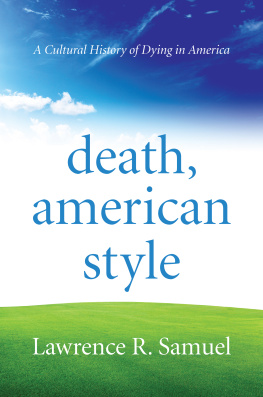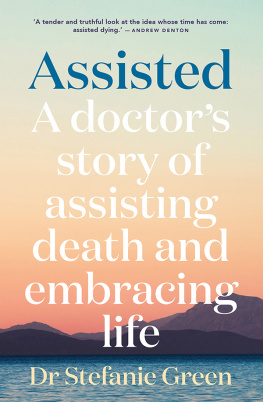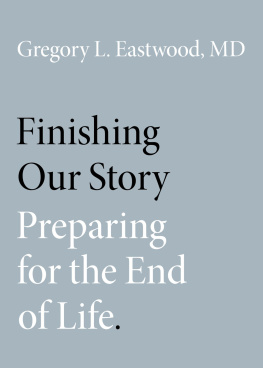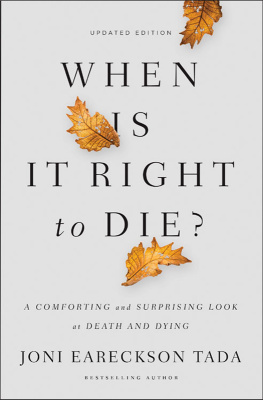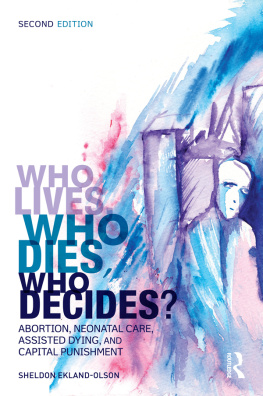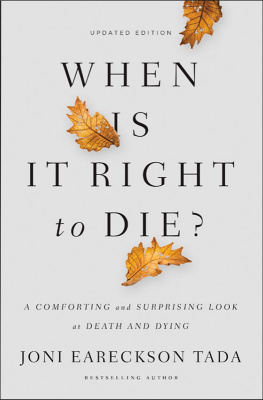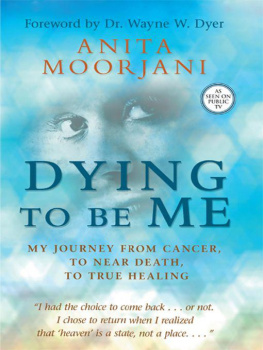CHAPTER 1
Spinning Away
Covering the walls in Joes home office in Vancouver, Washington, were dozens of glossy medals and framed pictures of running meetsa shrine to the hours and days he had spent pushing himself to the crest of physical triumph. Each of them carried vivid memories of carbo-loading dinners, auspicious bib numbers, and sports drinks in all colors of the rainbow. Now they served as blunt reminders of the life he once had, prediagnosis, when the muscles in his body still stretched, lunged, and churned without special effort, or even thought.
One of the photos shows Joe, probably in his late forties, in dark-blue shorts and a bright-yellow T-shirt. His short hair hemmed in by a white headband, he wears aviator sunglasses and a look of concentration on his face as he sprints the last couple of miles toward the finish line of the Portland marathon. The course flattens out here as runners weave their way through the downtown area to a shrill chorus of bystanders. Right behind Joe, a younger man with wiry legs picks up the chase. But Joe stares straight ahead and his stride looks strong. Its clear that he wont go down without a fight.
By the time I met Joe on a Sunday morning in early 2018, the days of his physical feats were long gone. As I walked up to greet him, he lay immobile in the middle of his living room in a dark leather recliner. A brown duvet was pulled up to his neck, warming a body that wouldnt obey him anymore. Solemn and alert, Joes denim-blue eyes peered out at me from behind his round, metal-rimmed glasses. Behind him, the rain drummed on a sliding glass door that opened into a drenched backyard. The rain wasnt unusual for this time of year, late February in the Pacific Northwest, but it added a brittle layer of gloom to the space.
When I had called his partner, Anna, to arrange the visit, she immediately launched into a description of all the roadblocks she and Joe had been facing to qualify him for Washingtons assisted dying law. She was talking fast, like a person frustrated by an unmet desire to be heard. I knew from my research with other families that navigating the bureaucracy of assisted dying laws could be a full-time job. But I was surprised to learn that someone with a clear-cut terminal diagnosis was having such difficulty.
In September 2016, at age seventy-two, Joe was diagnosed with ALSamyotrophic lateral sclerosis, also known as Lou Gehrigs diseasea progressive neurological disorder that destroys neurons responsible for muscle movement. In the United States, about six thousand people are diagnosed with ALS every year, and the diseases etiology still remains largely a mystery. After the initial onset of symptoms, the average life expectancy ranges from two to five years as the bodys muscle groups shut down one by one.
Joe was polite and soft-spoken. His lopsided smile, encased by a closely trimmed snow-white beard, surfaced only occasionally, when something truly amused him. Half an hour into our conversation, as I asked Joe and Anna to reconstruct the events of the past year and a half, Joe broke into a metallic cough. He motioned his chin toward the glass of water that sat between him and Anna on a side table.
His mouth has felt exceptionally dry today, Anna offered by way of an explanation. She picked up the glass and held it for him, waiting for his tongue to catch the straw.
I think I may have to have a manual cough assist, Joe whispered, his voice grainy and barely audible. Anna rose to her feet.
With ALS, you lose your core strength, your diaphragm, which you need for coughing, Anna said as she peeled the duvet from Joes body, baring his pale arms and legs, which had lost nearly all muscle definition. So we have a machine to clear the mucus in his airway, but Joe has discovered that this little thing we do is actually more effective.
Anna removed his head and neck rests and pressed a button on his recliner. Joes body slid slowly down and out of the chair. When his furry moccasin slippers hit the ground, she hoisted him uphe could still stand, but his upper body was so limp that he almost toppled overand scooped him up from behind. Though Anna was much smaller than Joe, she didnt seem to be straining. Joe was thin as a wafer.
Joe hung in Annas arms like a rag dollhis head drooping low on his chest, shoulders perched forward, and arms sagging by his sides like two power lines cut down by a storm. He used to be a tall man, but the disease had compressed his spinal cord.
Anna tightened her embrace and folded her hands flat on top of each other underneath his rib cage. Ready? she asked.
Joe murmured his response, looking straight down. On the count of three, Anna dug her hands into his abdomen in a quick upward motion while Joe tried to clear his throat. A feeble sound emerged. She pressed in again. Again.
It takes timing but, you know, were dancers. Weve got timing, she said, shooting me an apologetic glance. I told her that I didnt mind, wishing she could forget about me for a second, a witness to their tragic dance.
The fourth time, Joe emitted a forceful, guttural cough. That was a good one, Anna said, carefully releasing her embrace and helping Joe sink back into his recliner. He was still looking down, his neck muscles no longer strong enough to keep his head upright.
You can see, this is just a laugh a minute, isnt it? Anna said, trying to diffuse the lingering intimacy between us. She tucked her straight, silver hair behind her ears and stole a quick glance at Joe. He cracked a smile, fleeting but just in time for her to catch it.
Anna settled Joe back into the chair, propping his head up with two pillows and his neck brace. She knew exactly how to arrange everything. You could tell she had done it a hundred times. The whole ordeal had made Joe thirsty, and he had her lift the glass of water to his lips again so he could bite down on the straw. Joe closed his eyes. For a second, I wondered if he was going to drift off to sleep, but then he opened them again and looked at me, ready for the next question.
In the midsummer of 2016, Joe noticed weakness in his left hand during his weekly pickleball game. Pickleball combines elements of badminton, tennis, and table tennis. Players wield wooden or composite paddles on a small court. Joe was right-handed, but he couldnt get a good grip anymore when he used his left hand to pick up the ball. At first, Joe suspected that his watch was pressing down on his wrist, perhaps cutting off circulation to his hand. When the weakness persisted after playing without his watch, he thought he had strained his wrist or slept on it wrong. Maybe a pinched nerve, he speculated. But when the sensation didnt go away weeks later, he went to see a neurologist.
Anna was standing in the kitchen when Joe returned from his appointment. She had no reason to feel alarmed. She thought he was going to tell her that they had scheduled an MRI or X-ray for him. But he had other news for her.
Everybody has to die some time, Joe said.
What? Anna felt the ground turn unsteady beneath her feet.
The doctor is pretty sure, in fact, hes certain, that I have ALS.
Joe understood that ALS was fatal, but he didnt have any idea of how the disease would progress. His neurologist hadnt gone into much detail with him that day.
Anna clutched the counter and burst into tears. She knew exactly what an ALS diagnosis meant. One of her elementary school friends, a dentist, had died of ALS in his late thirties. She knew that ALS led to paralysis and went from one part of the body to another while the brain remained completely activea cruel joke, she called it.
Tom Samuels, one of the specialists Joe started seeing months later, had long studied the unique challenges an ALS diagnosis brings. A pulmonologist from Portland, Samuels wasnt licensed in Washington, but Joes health plan allowed him to see doctors within the Providence healthcare system across the Columbia River in Oregon. When I met Samuels at a coffee shop in Portland, he explained that ALS impacts three different groups of muscles.


